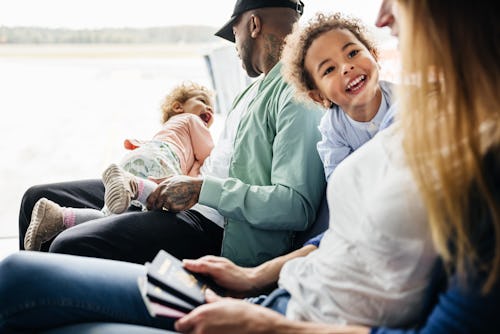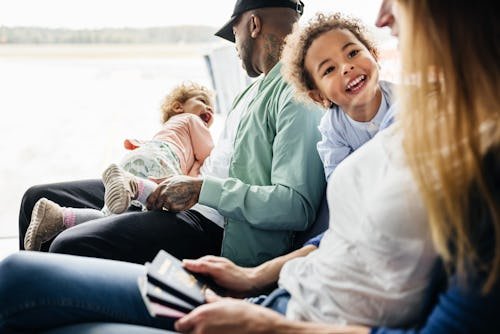
Whether you and your partner aren’t married but share kids, or you’ve remarried and each brought your own children into a blended family, or a whole host of other reasons, it’s not uncommon these days for parents to have a different last name than their kids. Generally speaking it’s no big deal, but if you’ve never flown with them before, you’re probably wondering: Can I travel if my child has a different last name than me, either domestic or international?
You totally can, according to family law experts, but you’ll want to bring some extra documentation along just to be safe.
International flights
In a blog post on her firm’s website, family law expert Siobhan Jeffels says traveling internationally is where you’re most likely to be questioned about having a different last name than your kid. This is because there are tighter security measures in place to prevent child trafficking. In addition to your kid’s passport, she recommends that parents bring:
- Your child’s birth certificate. This will list the full names of both parents and the child, and the child’s information will match their passport’s.
- Adoption documentation that proves you are your child’s legal guardian.
- Your marriage certificate. If your name has changed since your child’s birth and won’t match what’s on their birth certificate, traveling with your marriage certificate or change of name paperwork can explain that difference to officials.
- A child travel consent. If you’re traveling solo with your child internationally, regardless of whether your last names are the same, you’ll need a child travel consent to prove their other legal parent is OK with them leaving the country. But it might be especially important for parents whose last name differs from their kid’s — this will raise a flag for officials anyway — so it’s extra good to have. (You may not need one if you have sole custody of your child, but maybe bring that court order along to be safe.)
It’s also a good idea to warn your child that border officials may also ask them questions, and that it shouldn’t scare them or make them nervous. Encourage them to answer clearly and honestly and all will be well.
Lastly, you can check the U.S. Department of State’s Bureau of Consular Affairs website to find out what documents officials will want to see when you arrive and depart other countries. Just click into the travel advisory for your destination, visit its country information page, and scroll down to “Entry, Exit, and Visa Requirements.”
Domestic flights
There aren’t as many required documents when traveling within the U.S. Federal law doesn’t require anyone under 18 to show government ID to fly, but some airlines will have their own rules, so check with them about what documents they’ll want to see, says Rocket Lawyer. In most cases a birth certificate will do nicely — it’s proof of age, full name, and your parenthood all in one.
If you don’t share a last name with your child, a child travel consent is good to have, according to the same law experts. It should include the child’s name, travel companion’s name, travel dates, destination, and a statement of permission from the parent or parents (if the person taking the child is a grandparent or other adult). Then, sign it in front of a notary to make it official. You might not get asked for it when flying within the country, but if you are, you’ll be really glad you have it.
All in all, traveling with a child whose last name is different than yours is not the biggest deal in the world, as long as you do your research beforehand. After all, nobody wants to get told at customs that they have to turn around and go home for a birth certificate.
Disclaimer: This story has not been edited by us and is published as shown on Scary Mommy.


Leave a Reply